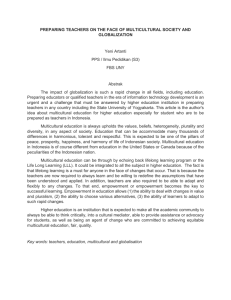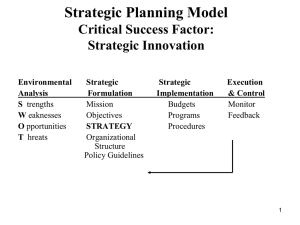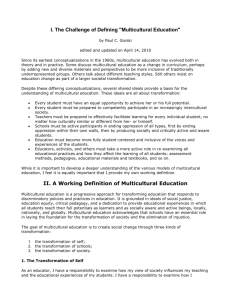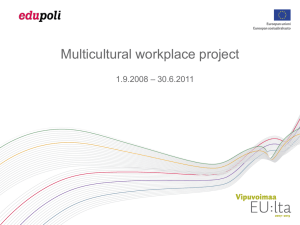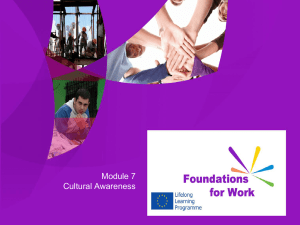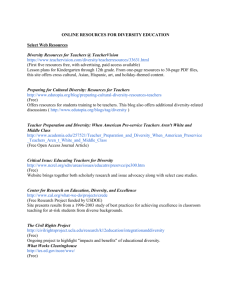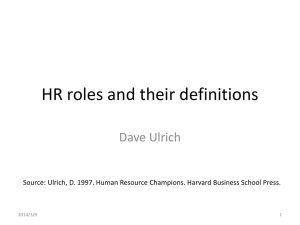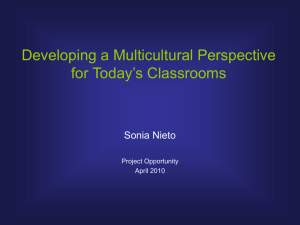COMMITTEE FOR MULTICULTURAL CURRICULUM
advertisement
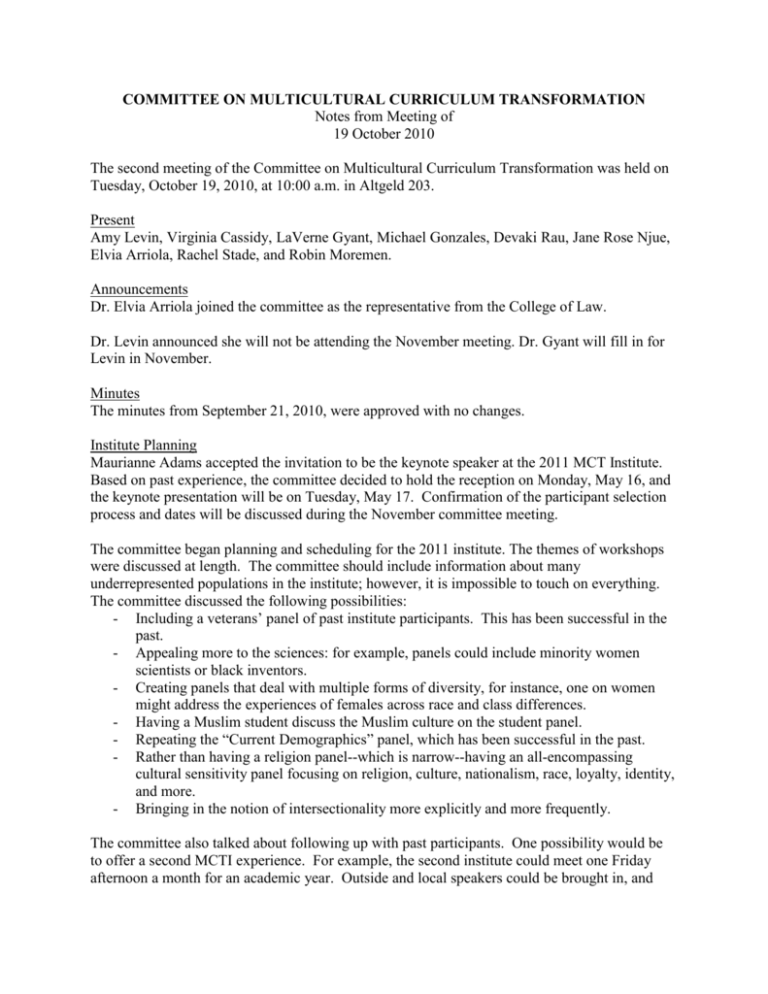
COMMITTEE ON MULTICULTURAL CURRICULUM TRANSFORMATION Notes from Meeting of 19 October 2010 The second meeting of the Committee on Multicultural Curriculum Transformation was held on Tuesday, October 19, 2010, at 10:00 a.m. in Altgeld 203. Present Amy Levin, Virginia Cassidy, LaVerne Gyant, Michael Gonzales, Devaki Rau, Jane Rose Njue, Elvia Arriola, Rachel Stade, and Robin Moremen. Announcements Dr. Elvia Arriola joined the committee as the representative from the College of Law. Dr. Levin announced she will not be attending the November meeting. Dr. Gyant will fill in for Levin in November. Minutes The minutes from September 21, 2010, were approved with no changes. Institute Planning Maurianne Adams accepted the invitation to be the keynote speaker at the 2011 MCT Institute. Based on past experience, the committee decided to hold the reception on Monday, May 16, and the keynote presentation will be on Tuesday, May 17. Confirmation of the participant selection process and dates will be discussed during the November committee meeting. The committee began planning and scheduling for the 2011 institute. The themes of workshops were discussed at length. The committee should include information about many underrepresented populations in the institute; however, it is impossible to touch on everything. The committee discussed the following possibilities: - Including a veterans’ panel of past institute participants. This has been successful in the past. - Appealing more to the sciences: for example, panels could include minority women scientists or black inventors. - Creating panels that deal with multiple forms of diversity, for instance, one on women might address the experiences of females across race and class differences. - Having a Muslim student discuss the Muslim culture on the student panel. - Repeating the “Current Demographics” panel, which has been successful in the past. - Rather than having a religion panel--which is narrow--having an all-encompassing cultural sensitivity panel focusing on religion, culture, nationalism, race, loyalty, identity, and more. - Bringing in the notion of intersectionality more explicitly and more frequently. The committee also talked about following up with past participants. One possibility would be to offer a second MCTI experience. For example, the second institute could meet one Friday afternoon a month for an academic year. Outside and local speakers could be brought in, and 2 participants would be given the opportunity to discuss how their curriculum was transformed as a result of their work in the first institute. The committee reviewed the assessment proposals that were developed last year. These documents were prepared to assess curricular, pedagogical, and personal transformation through the institute, though there was some overlap. Committee members considered whether participants could write statements to assess the institute instead of having to answer a plethora of questions with a Likert scale (“Agree, Disagree”, etc). Another idea was to have participants turn in a reflection along with their revised syllabi to characterize what they learned. Upon reflection, committee members decided that part of the difficulty with assessment was that they needed a clearer notion of their goals so they would know what to assess. They made a distinction between a committee goal, which might be to incorporate multicultural content across the curriculum. A participant’s goal might be to make a particular course more inclusive by revising a course syllabus. The committee developed an overarching statement of goals, to this effect: The goal of the multicultural institute (and by extension, the multicultural curriculum transformation committee) is to provide resources and activities for the development and improvement of multicultural competency among NIU’s instructional faculty, as evidenced in their curriculum content, pedagogy, and reflections on personal transformation with regard to diversity. “Homework”: 1. For the November meeting, all members of the committee will draft a sub-goal for each of these areas: content, pedagogy, and personal transformation. 2. Also, all committee members should think about how to fit panels into the schedule blank and consider possible faculty speakers. We are particularly open to ideas from new committee members, as we would like to include new speakers. The meeting was adjourned at 11:32 a.m. The next meeting is scheduled for November 16, 2010, from 10:00-11:30 in Altgeld 203.
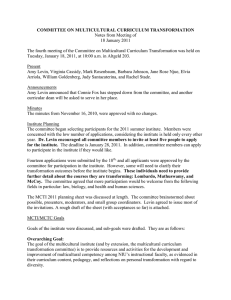
![September 21, 2010 [Word]](http://s2.studylib.net/store/data/015166467_1-484e956a9db8b903cc31eaae08c194e0-300x300.png)
